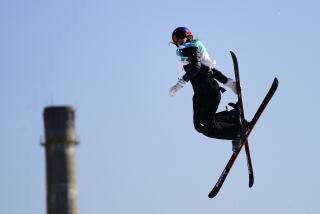Canadians Stay on Fast Track to Dominance
- Share via
NAGANO, Japan — To hear the speedskaters tell it, Canada has the fastest ice on the planet, the 1988 Olympic rink in Calgary.
Apparently it has the fastest skaters as well, at least in the women’s 500-meters, the race Bonnie Blair ruled with such elan through three Olympics.
When the second run of the 500 is skated here Saturday at M-Wave, the final pair will be Catriona Le May Doan and Susan Auch, high-flying Canadians who dominated in the first run Friday.
Le May Doan, the world-record holder and the dominant woman sprinter all season, uncorked a strong finishing kick and skated an Olympic-record 38.39 seconds. Then Auch, skating against American Chris Witty in the next pair, turned in a 38.42.
That left them 1-2, ahead of Japanese skaters Tomomi Okazaki and Kyoko Shimazaki. Witty, whose best event is the 1,000-meter race, was slow off the starting line and will have to do her medal-shooting from a distance, sixth place.
She said it wasn’t impossible, though, citing Canadian Jeremy Wotherspoon, who jumped from seventh to the silver medal in the men’s 500 earlier this week.
“The others could slip,” she said. “The others could fall. I have nothing to lose. Some of the people in front of me, especially those around second and third, have everything to lose.”
She didn’t mention Le May Doan, though, and probably with good reason.
The 27-year-old Saskatoon native has taken to the new clapskates as if they had been designed for her. She was seventh in the World Cup standings a year ago, but has ruled the 500 since switching, having won five of six World Cup races and finishing second in the other. The world record has fallen four times to her flashing blades and with her current best time of 37.55, she is the only woman to have dipped below 38 seconds.
“Catriona is in first place,” said Auch, the silver medalist four years ago at Lillehammer, Norway. “That’s where she’s supposed to be.”
Confidence is the key, Le May Doan said.
“I think the big thing is to be on the skates and to be able to build up trust,” she said. “When you’re going at such high speeds, you have to be able to trust your skates.”
That’s precisely what American Casey FitzRandolph was saying the other day about the Canadian sprinters.
“They have the fastest ice in the world up there and in a year that everyone is trying to adjust to new skates, what better ice to do that on?” he said. “They get used to those high speeds on the new skates and it shows.”
If nobody was surprised by the Canadians, however, there were raised eyebrows at the Japanese times.
With horns blaring from the crowd, Shimazaki became the first skater of the day to knock down the old Olympic record of 39.10, skating a 38.75.
Then Okazaki, skating in the last pair, turned in a 38.55.
Franziska Schenk, the bronze medalist in 1994, was fifth at 38.88. Sabine Voelker, second to Le May Doan at the world championship in Berlin last month, was 10th after a 39.19.
“I’m a little bit surprised at the Japanese,” American Coach Gerard Kemkers said. “They really rose to the occasion.
“The home-field advantage is pretty clear.”
More to Read
Go beyond the scoreboard
Get the latest on L.A.'s teams in the daily Sports Report newsletter.
You may occasionally receive promotional content from the Los Angeles Times.






